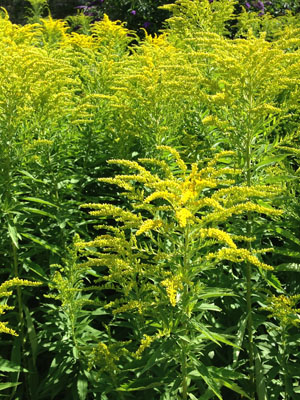Crop Rotation Group
Miscellaneous
|

|
Soil
Any well-drained soil with a neutral to slightly acidic pH.
|
Position
Full sun to partial afternoon shade.
|
Frost tolerant
Goldenrods are hardy perennials, tolerating winter cold to -30°F (-34°C).
|
Feeding
None generally needed. In very poor sites, drench with a liquid organic fertilizer when plants begin to grow tall in early summer.
|
Companions
-
|
Spacing
Single Plants: 11" (30cm) each way (minimum)
Rows: 11" (30cm) with 11" (30cm) row gap (minimum)
|
Sow and Plant
Goldenrod can be grown from seed, but it is much faster to start with a purchased plant in spring, Or, plant divisions taken from the outside of a friend’s clump. Most named cultivars are vegetatively propagated. Set out plants after the soil begins to warm in spring. In mild winter climates, goldenrods also can be planted in the fall. Young plants need water when they are actively growing. Once established, goldenrods are quite tolerant of heat and drought.
Our Garden Planning Tool can produce a personalized calendar of when to sow, plant and harvest for your area.
|
Notes
Goldenrods vary in their bloom time, but all bloom in autumn, starting in late August. They do not cause hay fever, which can be triggered by ragweed, a wild plant that blooms just before early goldenrods. Goldenrods are naturals as meadow plants, or as part of boundary plantings of native wildflowers. The most common roadside goldenrods, S. canadensis and S. gigantea, are aggressive spreaders that are difficult to control in flowerbeds. The roots send out underground rhizomes that give rise to new plants. Other species or selections such as ‘Fireworks’ (S. rugosa) do spread, but in a much more restrained fashion. Most goldenrods are native American plants. When choosing plants for wildflower meadows, consider species native to your area.
|
Harvesting
Gather stems for use in cut arrangements as you need them. Allow most of the flowers to remain intact so they produce fuzzy seed heads.
|
Troubleshooting
Powdery mildew is common late in the season, but it does not seriously weaken plants.
|